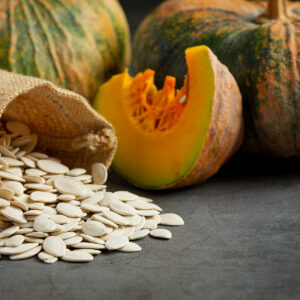No products in the cart.
Pumpkin seed
Pumpkin seeds, also known as pepitas (from the Spanish word for “little squash seed”), are the edible kernels of pumpkins, which belong to the Cucurbita pepo species. These flat, oval, dark green seeds are encased in a whitish-yellow husk, although some varieties of pumpkins produce “naked” seeds without a shell. Pumpkin seeds are a common byproduct of pumpkin harvesting, especially during the autumn season when pumpkins are widely used for culinary and decorative purposes.
Historically, pumpkin seeds have been a part of human diets for thousands of years. Archaeological evidence suggests that pumpkins were domesticated in North America as early as 7,500 to 5,500 BC, and their seeds were likely consumed as a nutritious food source.
Uses of Pumpkin Seeds:
Culinary Uses:
- Snack: Roasted and salted pumpkin seeds are a popular and nutritious snack.
- Salad Topping: They add a crunchy texture and nutty flavor to salads.
- Baking: Pumpkin seeds can be incorporated into bread, muffins, granola bars, and other baked goods.
- Granola and Trail Mix: They are a common ingredient in homemade and commercial granola and trail mix blends.
- Stir-fries and Vegetable Dishes: Pumpkin seeds can be sprinkled over stir-fries and roasted vegetables for added texture and flavor.
- Sauces and Dips: Ground pumpkin seeds can thicken sauces and add a nutty richness to dips like pesto or hummus variations.
Nutritional and Health Uses:
- Dietary Supplement: Due to their high nutrient content, pumpkin seeds are often consumed to boost intake of magnesium, zinc, iron, and healthy fats.
- Traditional Remedies: Historically, pumpkin seeds have been used in traditional medicine for various purposes, particularly related to prostate health and as a natural deworming agent (due to the presence of cucurbitacin).
Advantages of Pumpkin Seeds:
- Rich in Magnesium: Magnesium is crucial for muscle and nerve function, blood sugar control, and blood pressure regulation. Pumpkin seeds are an excellent source.
- High in Zinc: Zinc is essential for immune function, wound healing, cell growth, and metabolism. Pumpkin seeds provide a significant amount of this mineral.
- Good Source of Iron: Iron is necessary for oxygen transport in the blood. Pumpkin seeds can contribute to daily iron intake.
- Packed with Antioxidants: Pumpkin seeds contain various antioxidants, including carotenoids and vitamin E, which help protect cells from damage.
- Good Source of Fiber: Fiber promotes digestive health, helps regulate blood sugar levels, and can contribute to feelings of fullness.
- Healthy Fats: Pumpkin seeds are rich in monounsaturated and polyunsaturated fatty acids, which are beneficial for heart health.
- Contains Tryptophan: An amino acid that the body converts to serotonin and melatonin, which can promote relaxation and sleep.
- May Support Prostate Health: Studies suggest that pumpkin seeds may help alleviate symptoms of benign prostatic hyperplasia (BPH).
Disadvantages of Pumpkin Seeds:
- High Calorie Content: Due to their fat content, pumpkin seeds are relatively high in calories. Portion control is important, especially for weight management.
- Potential for Digestive Issues: Consuming large amounts of raw pumpkin seeds can sometimes lead to digestive discomfort, such as bloating or stomach cramps, due to their fiber and fat content.
- Sodium Content (Salted Varieties): Salted pumpkin seeds can be high in sodium, which may be a concern for individuals with high blood pressure. Opting for unsalted varieties is recommended.
- Phytic Acid Content: Pumpkin seeds contain phytic acid, which can bind to certain minerals (like zinc and iron) and reduce their absorption. Soaking or roasting seeds may help reduce phytic acid levels.
- Allergies: Although less common than other nut allergies, pumpkin seed allergies can occur in some individuals, leading to symptoms like hives, itching, swelling, or digestive issues.
- Choking Hazard (Small Children): Whole pumpkin seeds can be a choking hazard for young children.
- Potential for Laxative Effect (Excessive Consumption): The high fiber and oil content can have a laxative effect if consumed in very large quantities.
- Risk of Contamination: Like other seeds, pumpkin seeds can be susceptible to contamination with bacteria or fungi if not stored properly.





Reviews
There are no reviews yet.